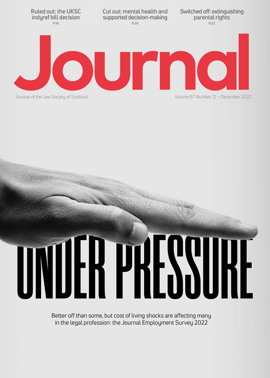Corporate: Is there a creditor duty?
BTI 2014 LLC v Sequana SA [2022] UKSC 25 is an important examination of company law and, as Lord Reed stated, provides guidance “of considerable practical importance to the management of companies”.
The case is the first time the Supreme Court has determined whether company directors owe a duty to consider, or act in accordance with, the interests of the company’s creditors in relation to the company becoming insolvent, or approaching or risking insolvency.
Facts of the case
The issues arose in 2009 when the directors of a UK company, AWA, approved a £135 million dividend to its sole shareholder, Sequana SA. Payment was made by set off against an intra-company debt owed to AWA by Sequana. Shortly afterwards, AWA was sold. At the time of the dividend AWA was solvent; however there existed, as its directors knew, contingent (though unquantified) liabilities from pollution in the USA. There was therefore a real risk that AWA could become insolvent in the future, although insolvency was not imminent or deemed probable.
When AWA became insolvent in 2018, BTI, who were creditors, started to question the legitimacy of the dividend payment in 2009, in particular given the knowledge of the possible future liabilities and the imminent sale of AWA.
The questions for the court were: (1) Is there a common law “creditor duty”? (2) Can a “creditor duty” apply to an otherwise lawful dividend? (3) What is the extent of a “creditor duty” and when does it arise?
The judgment
The Supreme Court unanimously dismissed BTI’s appeal, stating that AWA’s directors were not at the time of payment of the dividend under a duty to consider or act in accordance with the interests of the creditors (in the circumstances of this appeal). The majority judgment was provided by Lord Briggs, who used the term “creditor duty” as a “convenient label”, but agreed with Lord Reed that it was “in truth an aspect (where it arises) of the director’s fiduciary duty to the company, rather than a free-standing duty of its own”.
(1) Is there a common law creditor duty?
The Supreme Court determined yes, and considered that s 172(1) of the Companies Act 2006 can be modified in certain circumstances. Section 172(1) requires the directors to act in the way they consider, in good faith, would be most likely to promote the success of the company for the benefit of its members as whole. The modifications are that the company’s interests are taken to include the interests of its creditors as a whole. The court considered that this was supported by a long line of case law, together with the recognition of the duty in s 172(3), and also the principled justification that although creditors always have an economic interest in a company’s assets, that interest increases in importance when a company is insolvent or nearing insolvency.
It was held that the shareholder ratification principle does not prevent the existence of the creditor duty (as there cannot be ratification of a transaction entered into when a company is insolvent, or that would make the company insolvent). There is also no conflict with s 214 of the Insolvency Act 1986 in relation to wrongful trading.
(2) Can the creditor duty apply in relation to an otherwise lawful dividend?
The Supreme Court held yes, for two reasons. First, part 23 of the 2006 Act, governing the declaration and payment of dividends, was held as subject to any rule of law to the contrary. As the creditor duty is part of the common law and recognised by s 172(3), it is not excluded. Secondly, part 23 dictates that whether profits are available for distribution depends on whether there is a surplus on the company’s balance sheet. However a decision to pay a dividend that is lawful under part 23 may still be in breach of duty, where a company is cash flow insolvent as opposed to balance sheet insolvent. As Lord Briggs stated, this would result in a “foolhardy risk to the long-term success of the company”.
(3) What is the extent of the creditor duty and when does it kick in?
The court considered that the “creditor duty” was a balancing act. Where a company is insolvent or bordering on it (but not facing inevitable insolvency), the directors should consider creditor interests and balance them against those of the shareholders where there is conflict. In short, the greater the risk of insolvency, the more weight should be given to creditor interests. However, where a company is irretrievably insolvent, the creditors’ interests take precedence as the shareholders cease to retain any valuable interest in the company. Lord Briggs noted this as consistent with s 214 of the 1986 Act.
A majority of the court held the creditor duty applies when the directors know or ought to know that the company is insolvent or bordering on insolvency, or insolvency is probable.
Comment
The case provides helpful guidance on what can be a tricky area, and confirms that directors’ liability does not extend to where there is only a risk of insolvency (as opposed to actual, bordering or probable insolvency). Questions remain unanswered as to, for example, whether it is essential that the director knows or ought to know of said insolvency status (though keeping up to date with current events is a given). In practical terms, directors will still encounter difficult decisions in ascertaining exactly when on the scale the creditor duty kicks in.
Perspectives
Features
Briefings
- Criminal court: Farewell retrospective
- Agriculture: A future support framework
- Corporate: Is there a creditor duty?
- Intellectual property: "Reclaiming the UK statute book"
- Sport: Flouting their own rules?
- Succession: Crofting tenancy transfers in intestacy
- Scottish Solicitors' Discipline Tribunal: December 2022
- Property: Conveyancing – the future is in our hands
- In-house: With a fair wind







